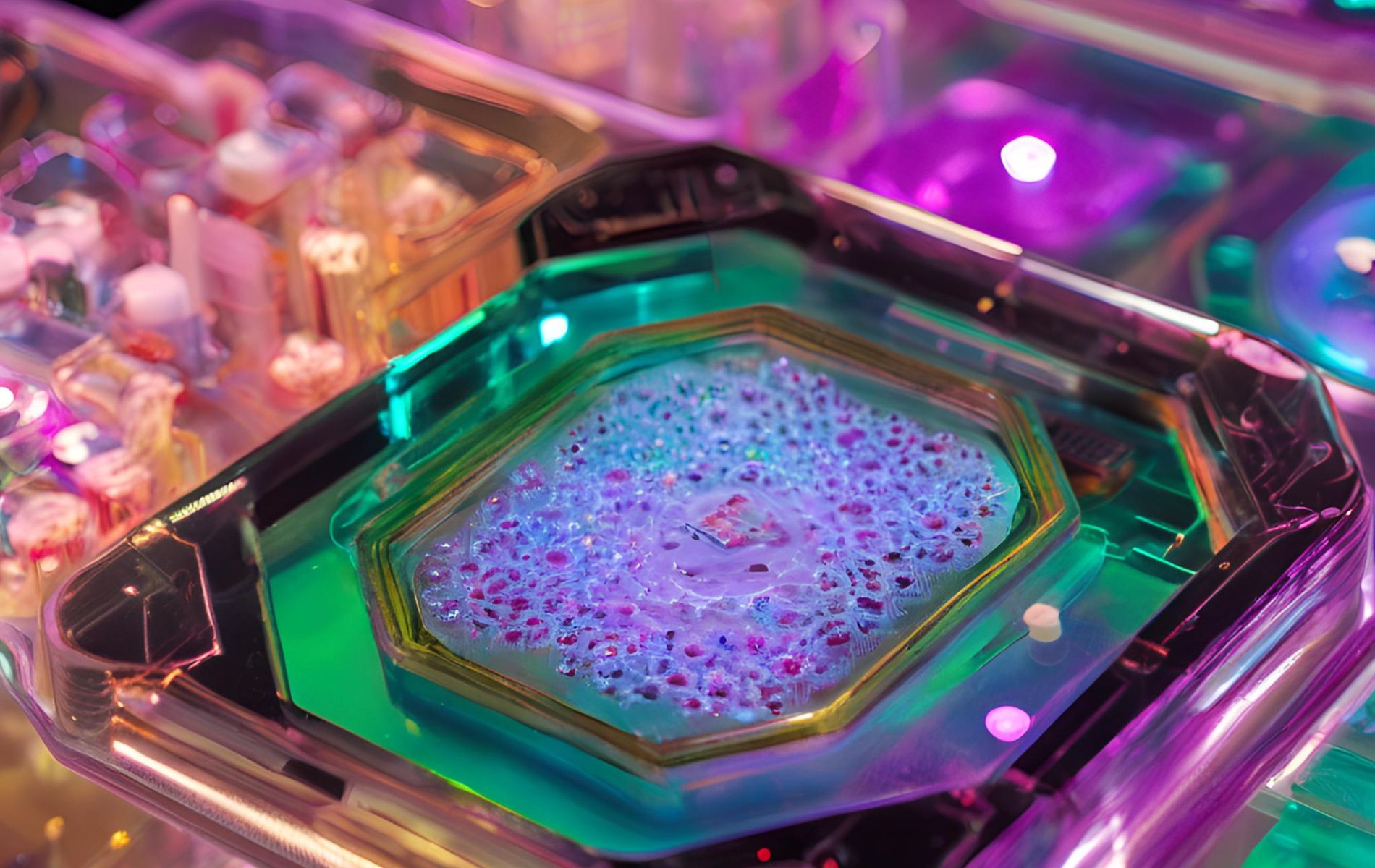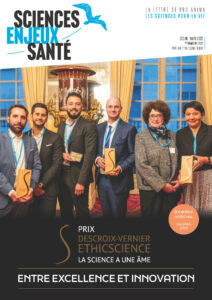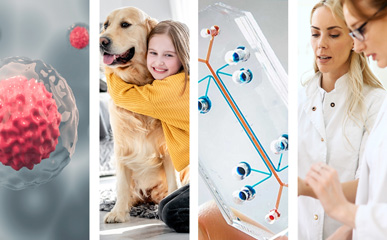
JRC latest report, Directors of Queen Mary CPM appointed to the UK ASC, Integrating organoids and organ-on-a-chip devices and more
News on non-animal methods
JULY 08 - 12, 2024NEWS, REPORTS & POSITION STATEMENTS
1. Latest report from the JRC : Exploring the societal impact of EU-funded biomedical research in selected disease areas and its link with NAMs
Over the past two decades, significant investments have been made to support basic and applied research in the areas of Alzheimer’s disease (AD), breast cancer (BC) and prostate cancer (PC), which, to date, remain highly prevalent diseases.
Considering the major research outputs associated with these diseases, the findings reveal a prevalence of animal-based approaches in AD research, with an upsurge in animal use specifically under H2020-funded projects. Notably, projects focusing on drug development, testing, or repurposing leaned heavily on animal models. Conversely, research targeting, clinical trial design, patient stratification, diagnosis and diagnostic tool development, lifestyle interventions, and prevention, primarily utilised non-animal methods.
2. Integrating organoids and organ-on-a-chip devices
Organoids and organs-on-chips are two rapidly emerging 3D cell culture techniques that aim to bridge the gap between in vitro 2D cultures and animal models to enable clinically relevant drug discovery and model human diseases. Despite their similar goals, they use different approaches and exhibit varying requirements for implementation. Integrative approaches promise to provide improved cellular fidelity in the format of a device that can control the geometry of the organoid and provide flow, mechanical and electrical stimuli.
In this Review, the authors discuss recent integrative approaches in the areas of intestine, kidney, lung, liver, pancreas, brain, retina, heart and tumour. They define implementation limitations and requirements for translation of the integrated devices, including determining the differentiation stage at which an organoid should be placed into an organ-on-a-chip device, providing perfusable vasculature within the organoid and overcoming limitations of cell line and batch-to-batch variability.
INTERVIEWS, NOMINATIONS & AWARDS
3. Prof. Ellen Fritsche awarded with the Norwegian Poulsson prize
The Norwegian Society for Pharmacology and Toxicology (NSFT) honors the German scientist and Prof. Ellen Fritsche, an internationally recognized scientist within the field of toxicology, by awarding her with this year’s Poulsson prize.
Prof. Ellen Fritsche, CEO of DNTOX and director of the Swiss Centre for Applied Human Toxicology (SCAHT) in Basel, Switzerland, has contributed to the scientific development of alternative methods to traditional animal tests, especially of methods for studying neurotoxicity during development (DNT), and for bringing such methods into the OECD system for international acceptance. She has inspired Norwegian scientists into research concerning these methods. She leads and participates in big international research projects and has authored more than 90 scientific papers, as well as scientific opinions and text book chapters.
DNTOX has also recently been listed in the German Biotechnology Report 2024 (EY and BIO Deutschland e. V.) as one of the selected German biotech startups leveraging artificial intelligence.
4. Duygu Yazici awarded by the Swiss 3R Competence Centre
The Swiss 3R Competence Centre (3RCC) announced the recipients of its prestigious annual awards. Among the winners : Duygu Yazici.
Duygu Yazici from the Swiss Institute of Allergy and Asthma Research, Davos, Associated Institute of University of Zurich, is awarded for her pioneering use of stem cell technology and organ-on-a-chip devices to create advanced lab models, providing ethical alternatives to animal testing.“Our innovative model not only adheres to the 3R principle but also provides critical insights into the molecular and cellular toxicity and regulation of environmental chemicals” said Duygu Yazici “This research is pivotal in developing less toxic products and exploring new therapeutic approaches to combat related diseases.”
Learn more about the awarded programme
5. Directors of Queen Mary CPM appointed to the government’s Animals in Science Committee
Prof Hazel Screen, Head of the School of Engineering and Materials Science and Professor of Biomedical Engineering, along with Prof Martin Knight, Faculty Dean for Research and Professor of Mechanobiology, have been appointed to the government’s Animals in Science Committee (ASC). The two are appointed in a job share capacity, as part of a focus to augment the committee’s expertise in non-animal technologies.
Martin and Hazel comment “We are delighted to be part of the Government’s Animals in Science Committee. […] We take this on as a job share, particularly related to our track record in driving research, and engaging with stakeholders via the Queen Mary’s Centre for Predictive in vitro Models (CPM) and the UK organ-on-a-chip technologies Network.”
6. Dr. Claire Rougeulle, new Director of the Research Center of Institut Curie
On July 3, 2024, the Executive Board of Institut Curie appointed Dr. Claire Rougeulle Director of the Research Center for a 5‑year term. She will take up her duties on a part-time basis from September 1, 2024, then on a full time basis from January 1, 2025. Claire Rougeulle holds a PhD in Molecular and Cellular Genetics from the Université Pierre et Marie Curie. After completing her post-doctorate at Harvard Medical School (Boston, USA), she joined the CNRS and worked at Institut Pasteur for 8 years.
Among her favorite topics, Dr. Claire Rougeulle wishes to initiate a reflection on the implementation of ethical and sustainable research, which is more respectful of the environment and more compatible with today’s healthcare challenges.
TOOLS, PLATFORMS, CALLS
7. 2025 Rio World Congress (WC13)- Call for Contributions ‘3Rs Integrating 3 Worlds : Human, Animal and Environmental Health’
Based on guidelines from the Alternatives Congress Trust to create a well-balanced program reflecting the 3Rs, WC13 Organizing Committee strives to integrate interdisciplinary content for diverse perspectives and learning experience.
It is now possible to submit a session proposal for WC13. All sessions within the WC13 program will be 60 minutes long. After submitting the session proposal, the Scientific Committee will review the session based on quality, innovation, and inclusivity. Potentially overlapping sessions may be merged. Session proposals are due by September 30, 2024, and can be edited until 1 PM BRT (GMT‑3).
INDUSTRY, BIOTECH & PARTNERSHIPS
8. Owkin brings its cutting-edge AI to nine of the top research centers in Germany, Austria and Switzerland
Owkin, the first end-to-end AI-biotech unicorn that provides best-in-class AI-driven precision drug discovery, development and diagnostics, has announced its expansion into the DACH region (Germany, Austria and Switzerland) following partnerships with nine of the top centers in the region, including Charité – Universitätsmedizin Berlin, Centre Hospitalier Universitaire Vaudois (CHUV), Universitätsspital Basel, Technische Universität München (TUM), Uniklinikum Erlangen, Universitätsklinikum Leipzig, Inselspital Bern, Universitätsklinik Mannheim-Heidelberg and Medizinische Universität Wien.
These collaborations signify unparalleled representation of patient populations, representing 24% of all outpatient cases and 15% of the total patients in the DACH region.
SCIENTIFIC DISCOVERIES & PROTOCOLS
9. Key brain protein reveals new insights for treating neurological disorders
Newly published research from Colorado State University answers fundamental questions about cellular connectivity in the brain that could be useful in the development of treatments for neurological diseases like autism, epilepsy or schizophrenia.
The work, highlighted in the Proceedings of the National Academy of Sciences, focuses on how neurons in the brain transmit information between each other through highly specialized subcellular structures called synapses. Despite their important role in linking neurons across different brain regions, the way synapses form and function is still not well understood, said Assistant Professor Soham Chanda. Chanda’s team used human neurons derived from stem cells to develop a model of the brain that could rigorously test these relationships. Using a gene-editing tool called CRISPR-Cas9, they were able to genetically manipulate the system and confirm the role of Gephyrin in the synapse formation process.
10. Fibrosis-on-Chip : A guide to recapitulate the essential features of fibrotic disease
Fibrosis, which is primarily marked by excessive extracellular matrix (ECM) deposition, is a pathophysiological process associated with many disorders, which ultimately leads to organ dysfunction and poor patient outcomes. Despite the high prevalence of fibrosis, currently there exist few therapeutic options, and importantly, there is a paucity of in vitro models to accurately study fibrosis.
This review discusses the multifaceted nature of fibrosis from the viewpoint of developing organ-on-chip (OoC) disease models, focusing on five key features : the ECM component, inflammation, mechanical cues, hypoxia, and vascularization. The potential of OoC technology is explored for better modeling these features in the context of studying fibrotic diseases and the interplay between various key features is emphasized.
11. Patient-derived mini-colons enable long-term modeling of tumor – microenvironment complexity
Existing organoid models fall short of fully capturing the complexity of cancer because they lack sufficient multicellular diversity, tissue-level organization, biological durability and experimental flexibility. To overcome these limitations, a new study published in Nature Biotechnologies implemented tissue-engineering and microfabrication technologies to develop complex, patient-specific cancer avatars.
Focusing on colorectal cancer, they generated miniature tissues consisting of long-lived gut-shaped human colon epithelia (‘mini-colons’) that stably integrate cancer cells and their native tumor microenvironment in a format optimized for real-time, high-resolution evaluation of cellular dynamics. They demonstrate the potential of this system through a comprehensive evaluation of drug effectivity, toxicity and resistance in anticancer therapies ; the discovery of a mechanism that drives cancer invasion ; and the identification of interactions among different components of the tumor microenvironment.


